007 for the Holidays: The John Barry - James Bond Soundtracks PART 1
“Do you expect me to talk?” -- “No, Mr. Bond. I expect you to groove…”
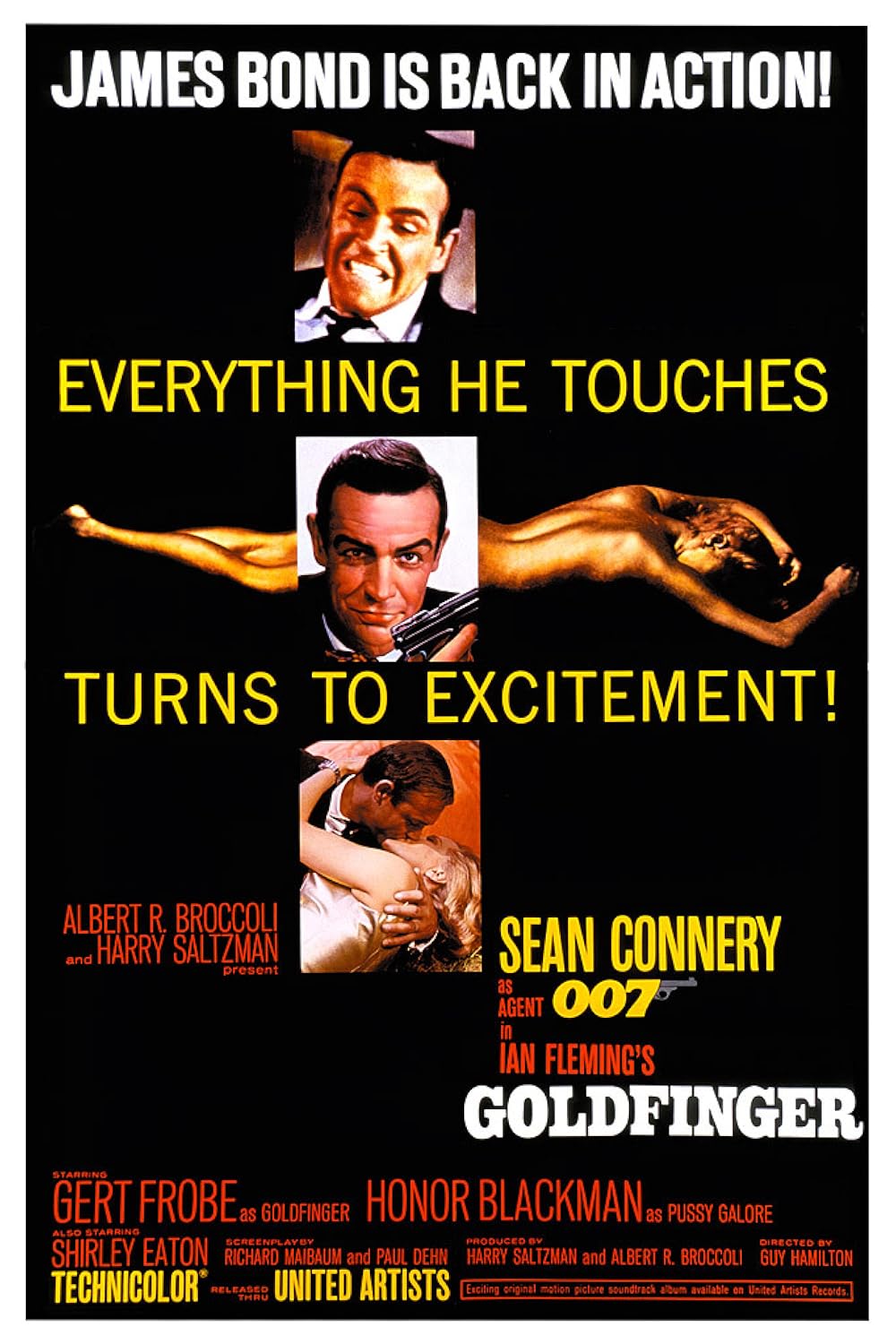
It’s an almost Pavlovian response.
The presents are opened, the Xmas day walk and dinner are done, mince pies (homemade) inhaled - and it’s time to watch a James Bond movie. Not one of the Daniel Craig or Pierce Brosnan ones - but “Vintage” Bond. Take your pick: Connery or Lazenby, Moore or Dalton. (The Daniel Craig and Pierce Brosnan outings are simply too “modern” for this Holiday ritual).
And preferably with a John Barry-penned soundtrack.
My Pavlovian need for Holiday Bond dates back to my childhood and teenage years back in the UK. At that time (the 1970s and 80s), before the advent of VCRs, the Holiday season brought forth a raft of movies on BBC1, BBC2, ITV (and later Channel 4), and none of them were more eagerly awaited or received than the choice selection of Bond movies that would drop, starting on Xmas Day.
In the Ward household, my mother had long since given up fighting my father’s (and my) Xmas Day Bond-watching ritual. My dad’s bedside table always sported at least one or two of the old 60s Pan paperback editions of the novels, with their distinctive covers. Several of these books had literally travelled to the ends of the earth with him, surviving months in backpacks and tents on top of lonely Himalayan peaks during his various mountaineering expeditions to parts unknown and unmapped. They were his comfort read. Dog-eared and battered, I swear some of them even persisted with a slight musky odor of yak. He loved those books!
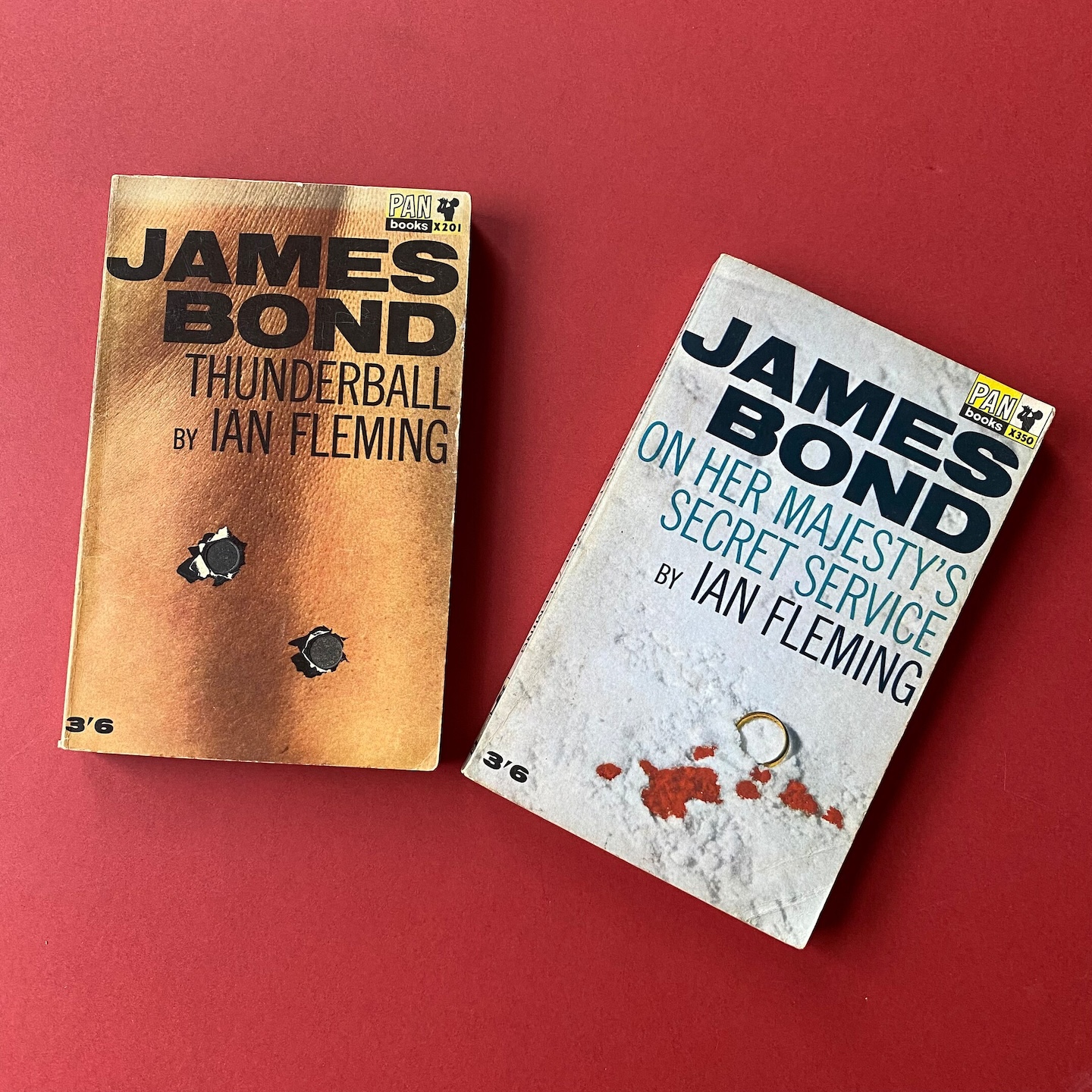
And he loved the movies. My first exposure to Bond was him taking me to see You Only Live Twice as a second-run at the Odeon Hammersmith (site of numerous fabled rock gigs, including Ziggy Stardust’s Farewell), probably when I was around 9 or 10 - and I never looked back.
So there we would be on Xmas Day: sated from the food and gifts, tired and probably a little damp from the inevitable rain, and sometimes snow, that had accompanied the obligatory Xmas Day walk, now more than ready for some Bond… James Bond.
This went on for years.
Early on I realized I LOVED the music of Bond, which meant the music of John Barry. I started buying various albums of his music, many of which are featured in this article. He is still my personal favorite of the great film composers, along with Bernard Herrmann.
Today I still get that itch to watch a vintage Bond movie over Xmas. Doesn’t always happen, but I definitely take some of these records out for a spin. After all the treacle of carols and Nutcrackers I’m ready for something with a little grit, something that will satisfy my Pavlovian desires.
And the John Barry James Bond music is just the ticket.
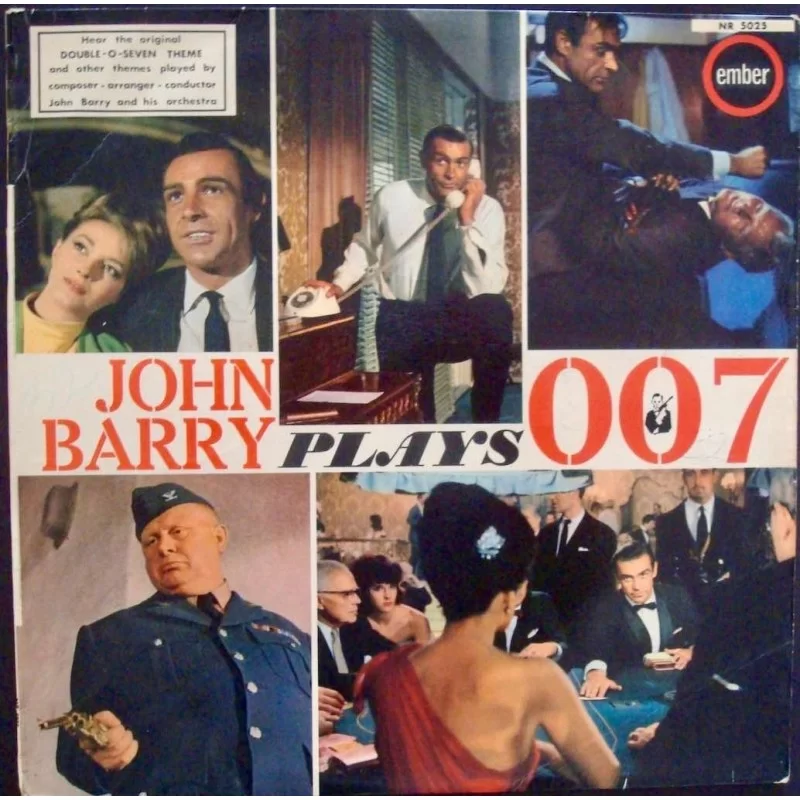 Rare 1965 LP of Barry playing re-orchestrations of his Bond music
Rare 1965 LP of Barry playing re-orchestrations of his Bond music
Also just the ticket for this time of year seems to be sharing my love for all this Spy Music with Tracking Angle readers. Last year at this time I wrote about my passion for the Decca Phase 4 Stereo series of Roland Shaw albums of Barry and other spy music of the 60s and 70s (you can read Part 1 here, and Part 2 here). These are audiophile guilty pleasure records which - if you like this kind of music - are mandatory purchases. (The artwork alone is worth the price of admission).
This “Spy Music at the Holidays” on Tracking Angle looks like it may become a new tradition..
Originally I’d intended to write about the brand new LaLaLand Records’ releases of remastered and complete editions of the Barry scores for Goldfinger, The Man with the Golden Gun, and Moonraker. However my copies have fallen into the black hole of the Xmas mail, so time for an alternative plan. (Those reviews will appear, I hope, in January).
This year I’m going to focus on the original soundtrack vinyl releases (and a few later CDs) as recorded by Barry himself - both the soundtracks and some compilation albums. Along with some familiar old friends, there are a few surprises to be had along the way.
Cue the gun-barrel opening…
My first Bond/Barry soundtrack purchase was this one, of the second Bond film, the first to feature a full John Barry score.
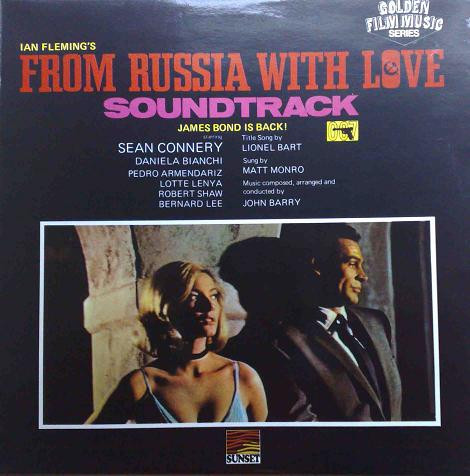
But before I get into From Russia with Love, some background on how Barry entered the series. The first Bond film, Dr. No, had been scored by Monty Norman (and very nicely too - I love my OG copy of the soundtrack, picked up for 50c at a Rhino Records yard sale, sounding vivid and present after a thorough cleaning).
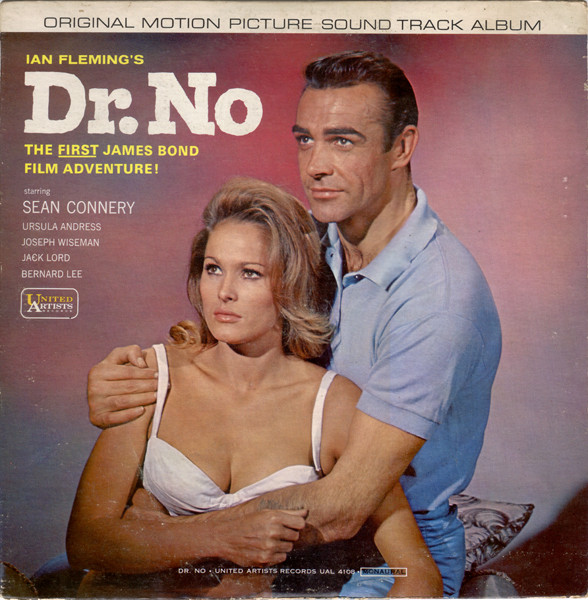
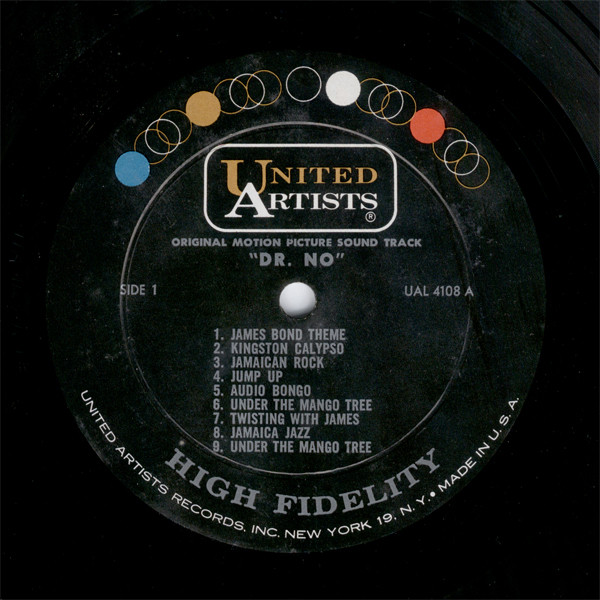
But during post-production the director Terence Young and his editor, Peter Hunt, realized the score needed some extra oomph, and were lobbying to bring in a new composer-arranger to provide a suitably up-tempo theme song for the picture’s Main Title, and also for selective use elsewhere during the film. Of the two Bond producers, Albert “Cubby” Broccoli was the most supportive of this idea; Harry Saltzman (in the first example of many during the Bond series when he supported some pretty inane music choices), felt that Norman’s song Underneath the Mango Tree would be sufficiently atmospheric (madness!).
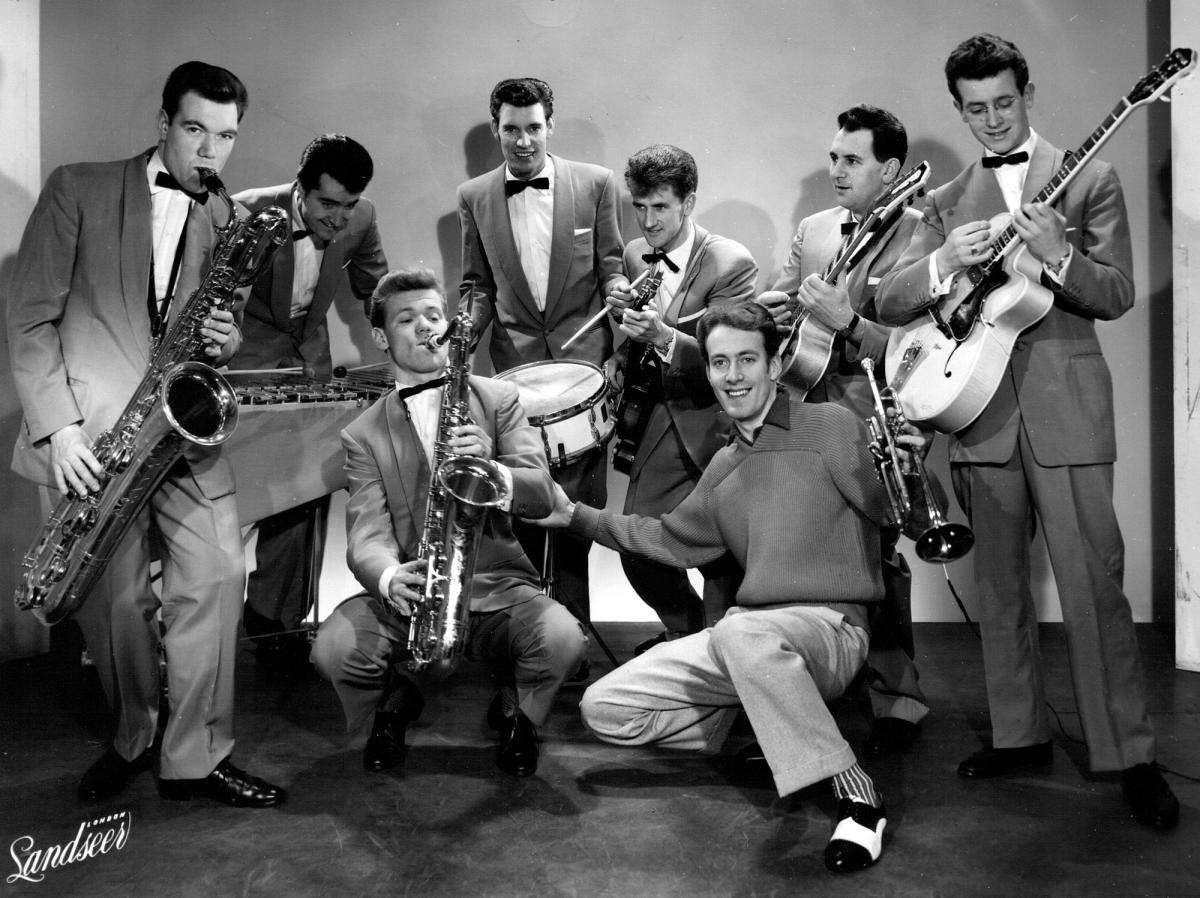 John Barry (front, with trumpet) with the John Barry Seven
John Barry (front, with trumpet) with the John Barry Seven
The name of the up-and-coming John Barry kept on coming up. He’d already had several hit records with his group The John Barry Seven, including Beat Girl. The music Barry came up with was the instantly iconic James Bond Theme, a rescoring (with extra composition in the bridge section) and re-imagining of a song called “Bad Sign, Good Sign” from an un-produced musical written by Norman. The theme makes its first appearance in Dr. No’s strikingly abstract title sequence, designed by future Bond-title sequence stalwart, Maurice Binder. Interestingly, after electronic sounds are used for the opening gun barrel sequence, the music starts in the more overtly jazzy, big-band bridge section, before segueing back into the theme’s iconic guitar solo as Sean Connery’s credit comes onscreen.
Vic Flick, player of that iconic guitar solo, was a member of the John Barry Seven (he's top right in the photo above).
As Jon Burlingame recounts in his essential book, The Music of James Bond:
A couple of days prior to the scheduled recording, Barry called Flick to confer about the guitar part.
“That sort of heavy guitar sound made him very happy,” Flick recalled. “It had an edge to it, sort of a dynamic sound. I went to his apartment, we talked about it and worked out what to do. I overplayed it - I leaned into those thick low strings with the very hard plectrum, played it slightly ahead of the beat, and it came out exciting, almost ‘attacking’, which fit the James Bond image".
Surprisingly, Flick did not play the bond theme on an electric guitar. Instead he played it on a Clifford Essex Paragon deLuxe acoustic guitar with a deArmond pickup, as he explained, “gripped by its supporting plates to the strings behind the bridge, and held away from the body of the guitar by a carefully folded Senior Service cigarette packet.” He used a Vox 15 amplifier, which the John Barry Seven had been routinely using the the time. Adding to the unique sound, Flick said, “some of my guitar sound was picked up on the many open microphones placed about the studio for the other musicians. This gave a ‘room’ effect that added to the general ambience.”
The James Bond Theme makes its first appearance in the film itself during the introduction of the title character in a casino, where he makes an impression on the flirtatious Sylvia Trench. That now very familiar music defined the character as instantly as did Connery’s lazy, lascivious lighting of a cigarette, and laconic seductive manner. The danger and sexiness of the man was all there in Barry’s brilliant creation, from the slinky, sliding bass line (in semi-tones) to the assertive, repetitive guitar line played over it.
Funnily enough, given how much his work had added to establishing the Bond phenomenon in Dr. No, Barry had no idea whether he was going to get the job of scoring the next film in the series, and was actually struggling to find work when he got the call for From Russia with Love.
And, even more oddly, the assignment came with the proviso that he would not be penning the film’s main theme song. That job went to Lionel Bart, whose musical Oliver! was a huge hit in London and on Broadway. The producers had realized that having a hit song for their movie would help promote it beyond the movie itself. Barry himself acknowledged that he had yet to pen a hit song, unlike Bart.
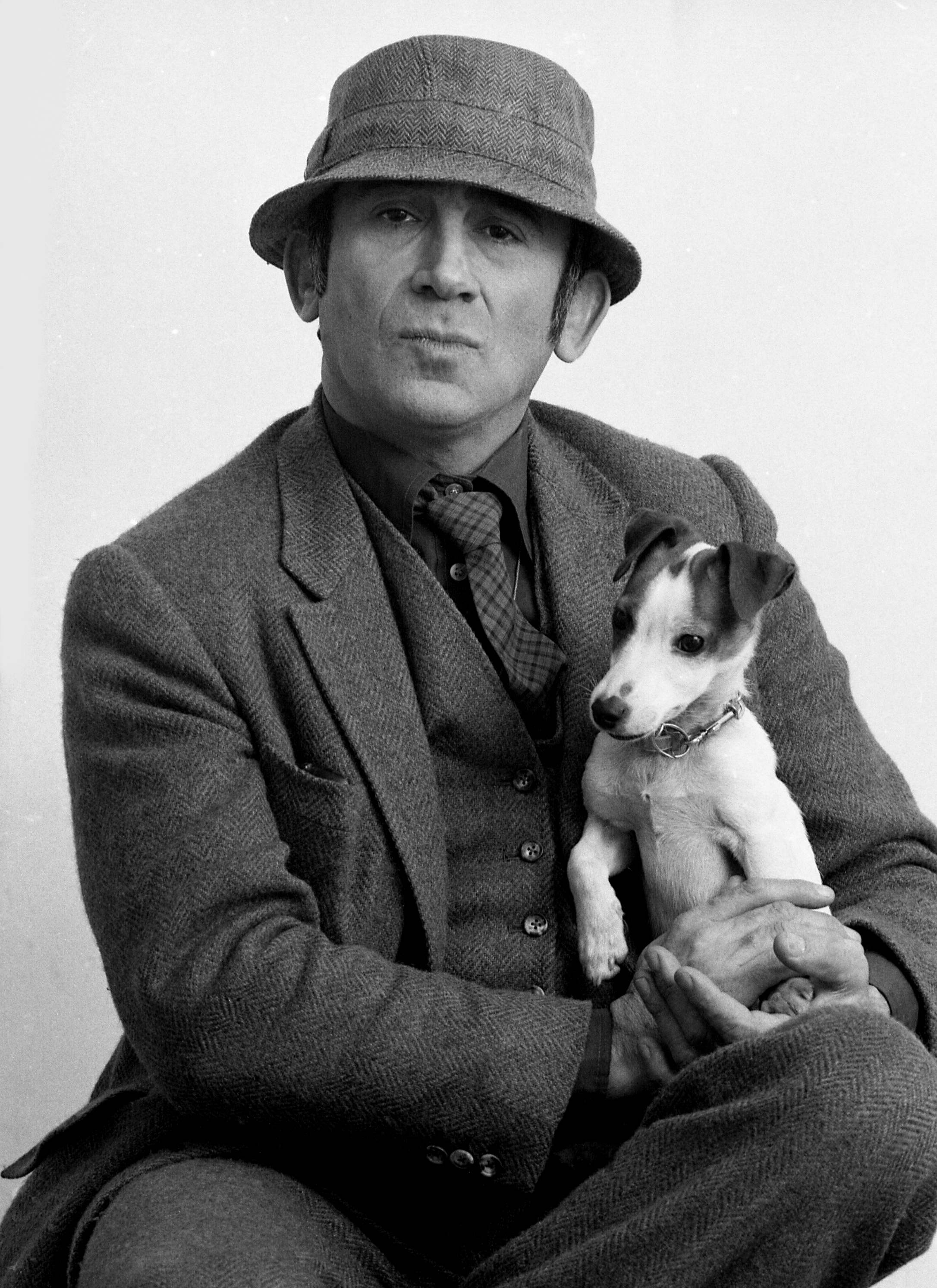 Lionel Bart
Lionel Bart
The sessions for that title song, sung by then current crooning heart-throb Matt Monro, were produced by George Martin. Getting a finished master that all were happy with proved elusive, and the final version is an amalgam of numerous takes - nevertheless it sounds effortless. The lovely decorative instrumental flourishes that sound like they are a cimbalon or balalaika are actually the sound of the studio’s “prepared” or “tack” piano (an instrument with various objects placed within it to alter the sound) recorded at half-speed and down an octave, then played back at normal speed - the kind of experimental technique so beloved of Martin on the Beatles records.
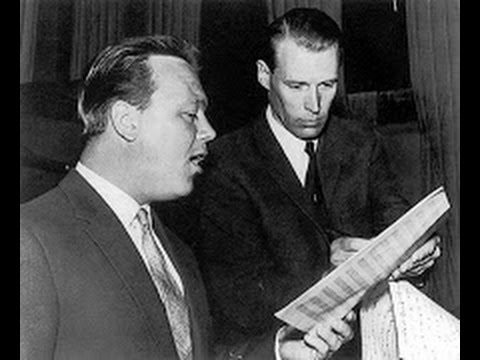 Matt Monro (l.) with George Martin
Matt Monro (l.) with George Martin
Ironically the vocal version is only heard in full over the film’s end title sequence. For the film’s opening titles, it is John Barry’s instrumental version that holds sway, with the Bond theme itself finally finding its proper home over the gun-barrel sequence that cues in the pre-credits sequence.
Given full rein on From Russia with Love, Barry rounds out the Bondian persona with attendant action and mood cues that are hard-wired into the movie’s world. Barry economically amplifies the exoticism of the Istanbul locations, the sexual heat of the Gypsy Camp scene, the lurking threat of SMERSH/SPECTRE, the gaunt, mounting menace of the would-be assassin of Bond, Grant (played suavely but chillingly by Robert Shaw).
Present on this and subsequent Bond soundtracks was Vic Flick. For the Gypsy Camp scene he had to improvise his entire solo during the sessions…
… a feat he repeated for the Roland Shaw cover versions recorded for Decca Phase 4 more than a decade later.
Barry himself created a new “James Bond” action cue, titled “007”, which was to put in repeated appearances over the years in subsequent films. It was no doubt partly done to stamp his own musical signature on the James Bond universe, to distinguish himself from Monty Norman (who would receive credit for “The James Bond Theme”, despite Barry’s major contribution - the subject of a years-long legal action).
The musical palette that would serve throughout Barry’s eleven movie run (!) is fully established in From Russia with Love. The jazz and blues tinged harmonic language, the alternately brooding and and stabbing brass chords, the sustained string lines that give away to florid violin arabesques, the jabbing percussion, the often slinky solo wind… All of this is allied to an unfailing gift for memorable melodies, simple but evocative. (Barry often labored mightily to come up with these deceptively simple ear-worms). It’s an unmistakably John Barry sound, tinged in each separate film with additional tonal and orchestral colors specific to the location and themes of each particular movie. It’s a sound that ushered in a whole new genre: spy music.
The score for From Russia with Love has always been a particular favorite of mine - I will tend to listen to it more often than Goldfinger. Maybe I’ve simply heard Goldfinger too often! My Golden Film Series, Sunset Records vinyl is a late 60s/early 70s UK reissue. My understanding of the earlier US/UK vinyl editions is that the pressings are noisier, and this is certainly born out when I compare my OG US Goldfinger promo copy with the later Sunset Records vinyl reissue. The 2003 CD of From Russia with Love remastering is drawn from the Soundtrack Master Tapes (not the film soundtrack tapes, which are apparently lost). Therefore there are no additional tracks as there are with several of the other 2003 titles. Until LaLaLand Records work their magic (as they have apparently done with their Goldfinger limited edition release, which I will be reviewing here shortly), you are stuck with the very decent sound of these vinyl editions, and the 2003 CD version, which is more than acceptable.
As mentioned earlier, I will be covering the next film in the series, Goldfinger (1964), in detail in my upcoming review of the LaLaLand reissue, so let’s now move on to Thunderball (1965).
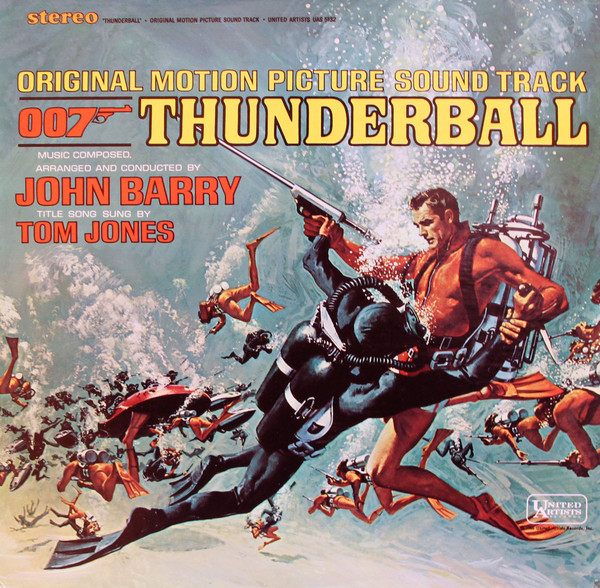 First US Stereo Pressing
First US Stereo Pressing
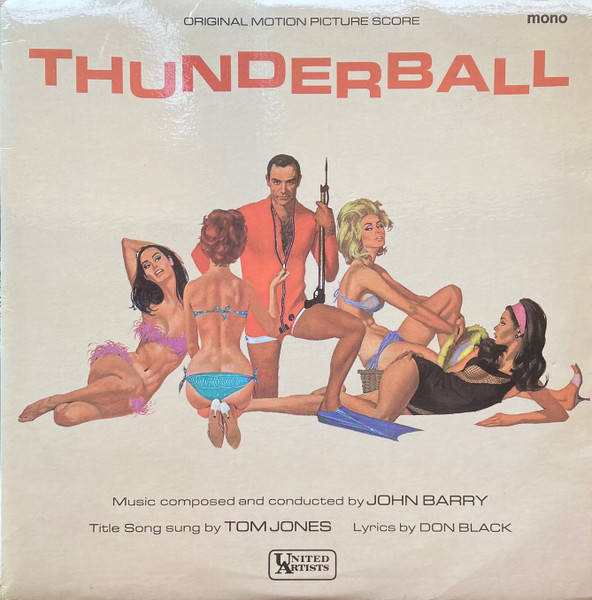 First UK Mono pressing, with different artwork
First UK Mono pressing, with different artwork
To match the increased scope and spectacle of this fourth Bond adventure, Barry wrote one of his most impressive scores of the series. Unfortunately, a huge amount of the score, especially the material composed for the climactic undersea battle, was not available on record or CD until the The Best of James Bond 30th Anniversary Edition was released on two CDs in 1992. Disc One contained just the various title theme songs up to that point, and was also available separately, but Disc Two is the one that Bond/Barry collectors must seek out. In addition to rare demos and tracks from all the films, there is a 21-minute suite of unreleased music from Thunderball. This was also made available on the expanded 2003 CD release of the complete soundtrack, albeit differently sequenced. The music accompanying the underwater battle at the climax of the film is a bravura demonstration of Barry’s compositional skills. It was quite the challenge: to inject excitement into what is essentially a slow-moving ballet of an action scene (because of being shot underwater). Peter Hunt’s formidable editing (he essentially invented modern screen action through his work on these early Bonds) does much to create the necessary pacing, but Barry’s music seals the deal.
To create that sense of being underwater, as Jon Burlingame notes:
…to create a feeling of suspension, Barry decided to make extensive use of harp, vibraphone, flutes and strings… recorded in such a way that the music seemed distant, or echoing. “Lots of echo, and no bass,” Barry later explained. “It was just melodies and lines floating. It wasn’t rooted, which is what you feel when you swim underwater; you’re not attached to anything. I just removed all that low end and did it in a stronger linear scale of overtones with alto flutes and vibraphones to create the effect.”
In these early stages of scoring, Barry was drawing on three main thematic elements: the Bond theme, “007”, and a new song that was going to be used for the title sequence, “Mr. Kiss Kiss Bang Bang”. In pre-production Barry had lobbied for a song NOT built around the film’s title of Thunderball, largely because no-one knew what that word meant! Lyricist Leslie Bricusse, who had done such sterling work on the theme song for Goldfinger, came up with the perfect words to match Barry’s insouciant, waltz-like theme: “He’s tall and he’s dark / and like a shark, he looks for trouble / that’s why the zero’s double…”
You would have thought that Shirley Bassey would have been first choice for vocalist, but it was actually Dionne Warwick who recorded it. Then, suddenly, the producers announced that United Artists was insisting the title song include the word “Thunderball”, so Barry rapidly regrouped, approaching Matt Monro’s manager, Don Black, to pen the lyric when Bricusse was not available. Black had just had a hit in the form of “Walk Away” for Monro.
There remained the problem of how to use the film’s title in the lyric. In a conversation with Jon Burlingame, Black recalled:
"I used it as a kind of code word. I thought the opening line was good - ‘he always runs while others walk’ - I thought, well, that’s Bond, isn’t it? I just kept going like that. I’ve always found that if the lyric hugs the contours of the melody and doesn’t offend what the composer’s written, you’re in pretty good shape. When I wrote it, I thought of two things: James Bond and Shirley Bassey [the vocalist on the title track of “Goldfinger”], that kind of full-throated, powerful voice. It’s a Bond thing - ‘any woman he wants, he’ll get / he will break any heart without regret’ - it’s a summation of that lifestyle.”
Black called upon his old friend Tom Jones, the newly minted Welsh popstar with two recent Top 10 hits - “It’s not unusual” and “What’s new, Pussycat?” - to do vocal duties.
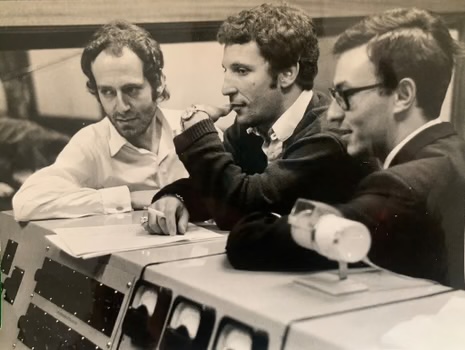 John Barry, Tom Jones (c.) and Don Black
John Barry, Tom Jones (c.) and Don Black
The song is a real belter, and I had the great pleasure of hearing Jones sing it live at the AFI Lifetime Achievement Award for Sean Connery back in 2006. After a raft of tributes, the lights dimmed and the stage curtains rose to reveal disco platforms with flashing lights and gyrating go-go dancers in full 60s get-up, and as the familiar Barry brass blared out over massive drums and percussion, out strode Mr. Jones, who proceeded to blast the song as if the intervening 40 years had evaporated. It was sensational and brought down the house!
Famously, at the original sessions, Barry had told Jones to hold the last note for as long as possible, to duplicate (in some measure) Ms. Bassey’s now notorious feat at the end of “Goldfinger”. Recalls Jones:
“I closed my eyes, hit the note and held on. When I opened my eyes the room was spinning. I had to grab hold of the booth I was in to steady myself. If I hadn’t, I would not have passed out, but maybe fallen down. But it paid off, because it is a long note [nine seconds] and it’s high.”
Barry then had to go back into the score and retrofit sections of it to accommodate musical material derived from the new title song. He was very strict throughout the Bond years about building his scores around the theme song, to give each film its own distinct musical personality.
At this point, the producers decided to reinstate the song “Mr. Kiss Kiss Bang Bang” in the end titles, and now Shirley Bassey was brought in to record a new version. However, her performance was sub-par and it was decided to drop her version from the film. Furious, Bassey sued. The result was she was not involved in another Bond picture until Diamonds are Forever, over half a decade later.
You can compare the Dionne Warwick and Shirley Bassey versions of “Mr. Kiss Kiss Bang Bang” on CD 2 of that 30th James Bond Anniversary collection. Also below… (the long introduction in the Dionne Warwick was necessitated by the desire to not have the vocal begin until the film’s title cam up onscreen).
The Original Soundtrack album for Thunderball barely represents a fraction of Barry’s huge score. Nothing from the film’s final 39 minutes made it onto the LP because of mastering and pressing deadlines. For the most complete soundtrack experience, seek out the 2003 CD. This is one I fervently hope LaLaLand Records will be reissuing in their remastered Bond series. It contains some of Barry’s best work.
Suite from Thunderball, feaured on the 30th Anniversary Collection
But, in fact, Barry was just getting into his Bond stride, as the next two films amply demonstrated.
Continued in Part 2…
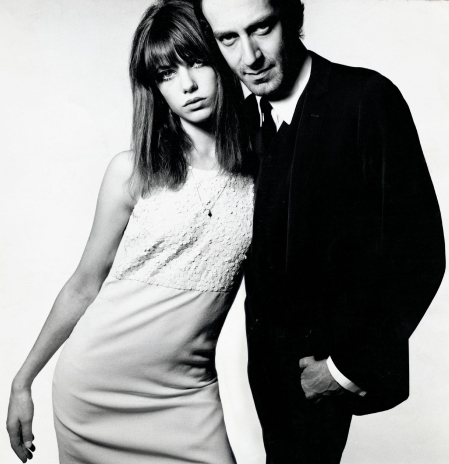 John Barry with his then wife, Jane Birkin
John Barry with his then wife, Jane Birkin
The image of John Barry conducting the orchestra at CTS Studios, featured in the cover photo for this article, is taken from "Music by John Barry - A Chronology of Selected Works", by Jon Burlingame, Geoff Leonard, and Peter Walker. It is an essential purchase for any fan of Barry's music, and can be found here.
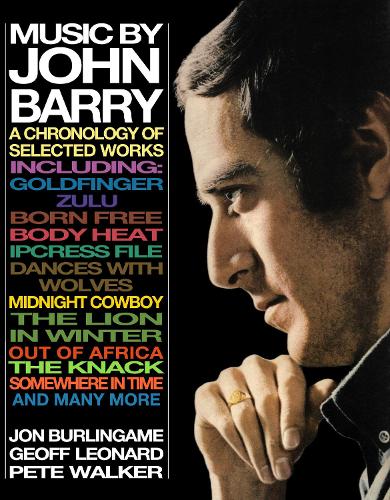


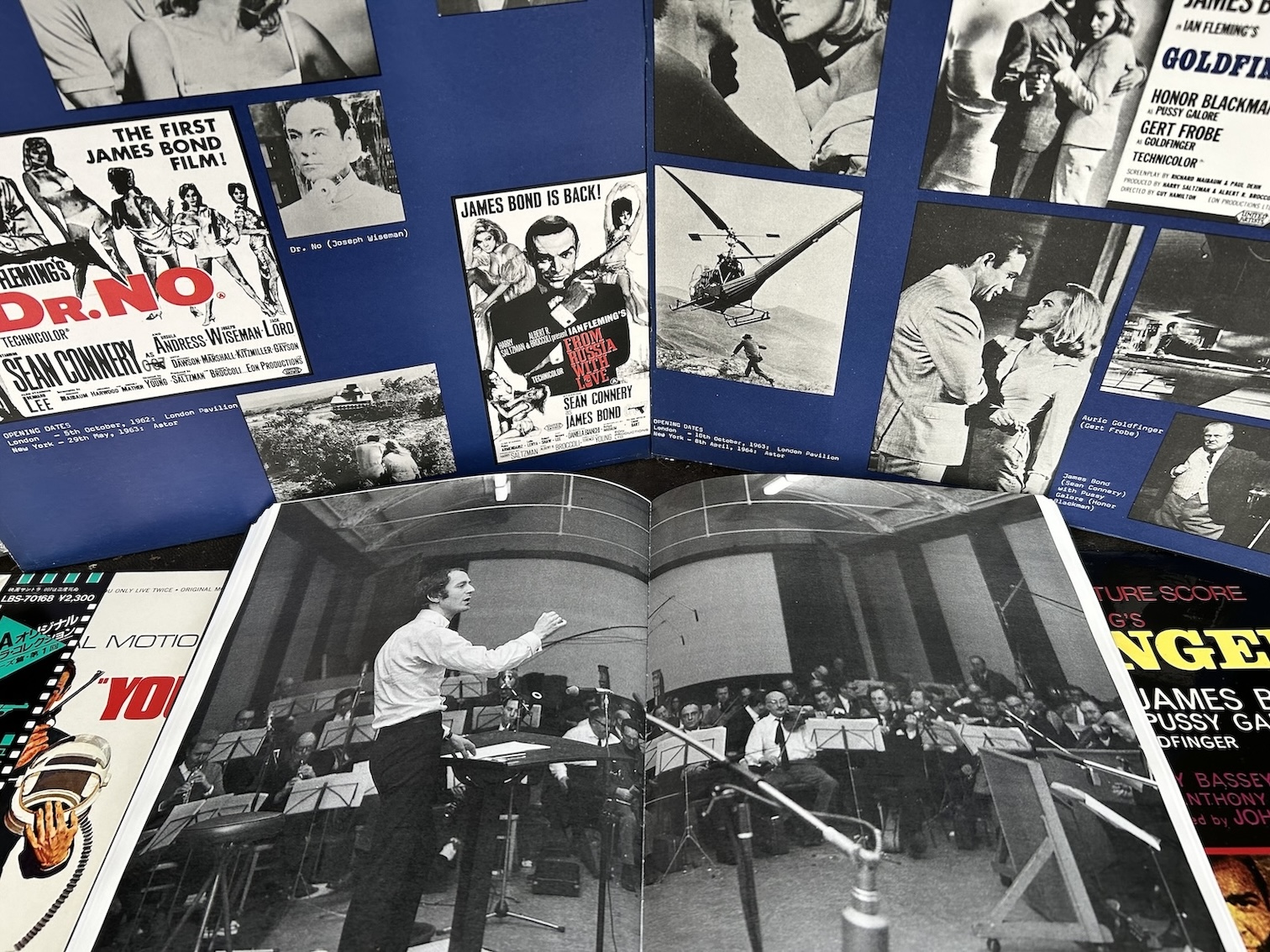




































.png)








